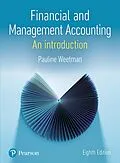Get a critical understanding of the 'why' behind the 'what' in Financial Management Accounting.
Financial & Management Accounting: An Introduction, 8th edition is a core textbook in the field, written by leading expert teacher in Accounting, Pauline Weetman.
An essential learning resource for undergraduates on Business Studies degrees, Accounting courses, or MBA students and professionals, this comprehensive introduction will provide the foundation you need for your course, presenting a more critical approach to the subject.
The eighth edition of the text retains all the features that have contributed to the book's popularity: with its clear and accessible writing style, focus on the accounting equation, and extensive use of real-world case studies, the book aims to guide you through the 'why' and not just the 'what' of financial and management accounting.
Key features include:
- Definitions and terminology aligned with the 2018 IASB Conceptual Framework
- Content fully up-to-date with the International Financial Reporting Standards (IFRS)
- New case studies giving examples from real-world companies
- Focus on specific knowledge outcomes with end-of-chapter self-evaluation
- Questions graded according to difficulty, allowing you to test your understanding
- Activities aligned to each section of a chapter, encouraging students to explore and consider issues from different viewpoints
With a range of activities throughout the chapters that encourage you to explore and consider issues from different viewpoints, this market-leading text is a fundamental learning resource and introduction to the field.
Autorentext
Pauline Weetman BA, BSc (Econ), PhD, CA, FRSE, is Professor Emerita of Accounting at the University of Edinburgh, and has extensive experience of teaching at undergraduate and postgraduate level, with previous chairs held at Stirling, Heriot-Watt, Strathclyde and Glasgow Universities. She received the Distinguished Academic Award of the British Accounting Association in 2005. She has convened the examining board of the Institute of Chartered Accountants of Scotland and was formerly Director of Research at ICAS.
Klappentext
Written by an expert teacher in Accounting, this edition of this well-respected text retains all the features that have contributed to the book's popularity: focus on the accounting equation, an even greater range of student activities throughout each chapter, a clear and accessible writing style, and extensive use of real-world case studies. With a strong emphasis on the 2018 Conceptual Framework of the International Accounting Standards Board, Financial & Management Accounting: An Introduction guides students in understanding the 'why' and not just the 'what' of financial and management accounting.
The full text downloaded to your computer
With eBooks you can:
- search for key concepts, words and phrases
- make highlights and notes as you study
- share your notes with friends
eBooks are downloaded to your computer and accessible either offline through the Bookshelf (available as a free download), available online and also via the iPad and Android apps.
Upon purchase, you'll gain instant access to this eBook.
Time limit
The eBooks products do not have an expiry date. You will continue to access your digital ebook products whilst you have your Bookshelf installed.
Inhalt
- Part 1 A conceptual framework: setting the scene
- 1 Who needs accounting?
- 2 A systematic approach to financial reporting: the accounting equation
- 3 Financial statements from the accounting equation
- 4 Ensuring the quality of financial statements
- Part 2 Reporting the transactions of a business
- 5 Accounting information for service businesses
- 6 Accounting information for trading businesses
- Part 3 Recognition in financial statements
- 7 Published financial statements
- 8 Non-current (fixed) assets
- 9 Current assets
- 10 Current liabilities
- 11 Provisions and non-current (long-term) liabilities
- 12 Ownership interest
- Part 4 Analysis and issues in reporting
- 13 Ratio analysis
- 14 Reporting corporate performance
- 15 Reporting cash flows
- Part 5 Setting the scene and defining the basic tools of management accounting
- 16 Functions of management accounting
- 17 Classification of costs
- 18 Product costs: materials, labour and overheads
- Part 6 Job costs and stock valuation
- 19 Job costing
- Part 7 Decision making
- 20 Break-even analysis and short-term decision making
- Part 8 Planning and control
- 21 Preparing a budget
- 22 Standard costs
- 23 Performance evaluation and feedback reporting
- Part 9 Capital investment appraisal and business strategy
- 24 Capital investment appraisal
- 25 Business strategy and management accounting
